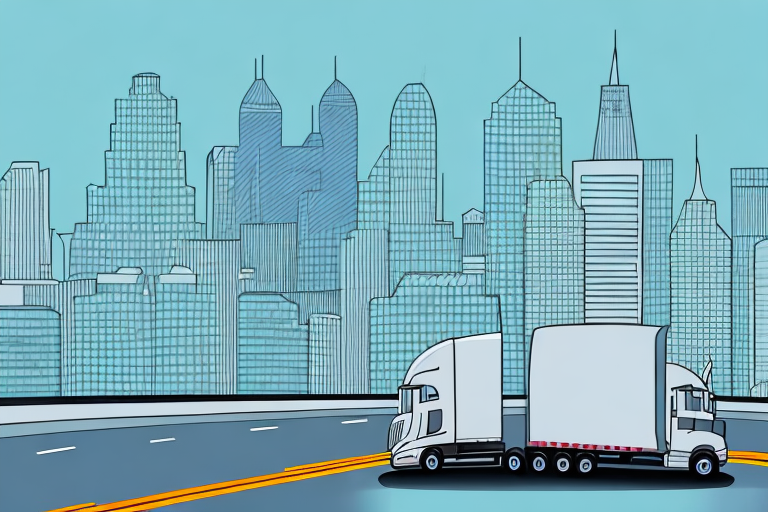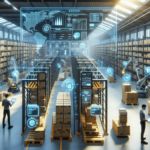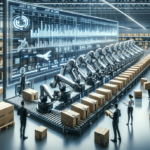Technological Advancements in Logistics
Technology continues to revolutionize the logistics industry, driving efficiency and innovation. Key advancements include the Internet of Things (IoT), blockchain, and artificial intelligence (AI).
Internet of Things (IoT) in Supply Chain
IoT sensors are increasingly deployed throughout the supply chain to collect real-time data on inventory levels, shipment locations, and conditions. According to a McKinsey report, IoT can improve supply chain visibility by up to 30%, leading to more informed decision-making and reduced operational costs.
Blockchain for Enhanced Transparency
Blockchain technology provides a secure and immutable ledger for tracking goods across the supply chain. This enhances transparency and traceability, reducing fraud and errors. A study by Forbes highlights how blockchain can decrease discrepancies in supply chains by 25%, fostering greater trust among stakeholders.
Artificial Intelligence and Automation
AI-powered systems analyze vast datasets to predict demand, optimize routes, and manage inventory. Automation through robotics and autonomous vehicles further streamlines operations. According to Supply Chain Digital, AI can reduce logistics costs by up to 15% while improving delivery accuracy.
The Impact of E-commerce on Logistics
The exponential growth of e-commerce has reshaped the logistics landscape, driving demand for faster and more reliable delivery services.
Rise of Same-Day and Next-Day Delivery
E-commerce giants like Amazon have set consumer expectations for rapid delivery. This has led to widespread adoption of same-day and next-day delivery services, necessitating more sophisticated logistics networks. A Statista survey indicates that 60% of consumers prefer same-day delivery, pushing logistics providers to innovate.
Sustainable Delivery Solutions
With the increase in delivery volumes, sustainability has become a priority. Logistics companies are investing in electric vehicles and optimizing delivery routes to reduce carbon emissions. According to the United Nations Environment Programme, adopting electric delivery vehicles can cut greenhouse gas emissions by up to 40%.
Sustainability in Logistics
Environmental responsibility is a growing concern in logistics, leading to the development of green logistics practices aimed at minimizing the industry's ecological footprint.
Adoption of Electric Vehicles
Electric vehicles (EVs) are becoming more prevalent in delivery fleets, offering a cleaner alternative to traditional diesel trucks. Companies like UPS and DHL are expanding their EV fleets, contributing to significant reductions in emissions. The ACEA report states that the transition to EVs could reduce logistics-related emissions by millions of tons annually.
Green Warehousing Practices
Warehouses are implementing energy-efficient systems, such as LED lighting and solar panels, to lower their environmental impact. Additionally, optimizing warehouse layouts and utilizing automation reduces energy consumption. The Warehouse News highlights that green warehousing can lead to energy cost savings of up to 20%.
Data-Driven Logistics Management
Leveraging big data analytics is essential for optimizing logistics operations, enhancing efficiency, and reducing costs.
Utilizing Big Data for Optimization
Big data allows logistics providers to analyze patterns and trends, enabling better forecasting and inventory management. According to Forbes, big data can improve supply chain efficiency by up to 25%, helping companies stay competitive in a dynamic market.
Real-Time Supply Chain Visibility
Real-time tracking and data analytics provide enhanced visibility across the supply chain, allowing for proactive issue resolution and improved customer satisfaction. A report by Gartner projects that supply chain visibility solutions will grow by 28% in 2023, highlighting the increasing importance of data-driven approaches.
Innovations in Last-Mile Delivery
Last-mile delivery remains one of the most challenging aspects of logistics, driving continuous innovation to enhance efficiency and customer satisfaction.
Drones and Autonomous Vehicles
Drones and autonomous vehicles are being tested and implemented to expedite deliveries and reduce labor costs. Companies like Amazon and Google are at the forefront, developing drone delivery services that promise faster and more efficient last-mile solutions. According to Business Insider, drone deliveries could reduce delivery times by 50%, significantly enhancing customer experience.
Locker Systems and Micro-Fulfillment
Automated locker systems and micro-fulfillment centers are being employed to streamline the last-mile process. These solutions offer convenient pickup points, reducing the need for home deliveries and minimizing traffic congestion. The Retail Dive reports that micro-fulfillment centers are expected to grow by 35% over the next five years, driven by increasing e-commerce demand.
Global Supply Chain Challenges and Opportunities
Operating on a global scale presents unique challenges and opportunities, requiring logistics providers to navigate complex regulatory environments and diverse market conditions.
Navigating Regulatory Frameworks
Global logistics involves compliance with varying international regulations, customs procedures, and trade agreements. Effective management of these complexities is crucial for seamless operations. The World Bank emphasizes the importance of robust regulatory frameworks in facilitating efficient global trade.
Emerging Markets Growth
Emerging markets offer significant growth potential for logistics providers, driven by rising consumer demand and expanding economies. However, challenges such as inadequate infrastructure and fragmented supply chains must be addressed. According to McKinsey, logistics companies can achieve up to 20% revenue growth by effectively tapping into emerging markets with tailored strategies.
Enhancing Customer Experience through Technology
Customer satisfaction is paramount in logistics, and technology plays a crucial role in enhancing the overall customer experience.
Real-Time Tracking and Notifications
Providing customers with real-time tracking information and delivery notifications ensures transparency and reduces uncertainty. Tools like GPS tracking and automated alerts keep customers informed about the status of their shipments. According to Supply Chain Dive, businesses offering real-time tracking see a 15% increase in customer satisfaction.
AI-Powered Customer Support
AI-driven chatbots and virtual assistants offer swift and efficient customer support, addressing inquiries and resolving issues promptly. These technologies enhance the customer experience by providing 24/7 assistance and reducing response times. A report by IBM indicates that AI-powered support can improve customer service efficiency by 30%.
Conclusion
The logistics industry is undergoing a profound transformation driven by technological advancements, evolving consumer expectations, and a focus on sustainability. By embracing innovations such as IoT, blockchain, AI, and sustainable practices, logistics providers can enhance efficiency, reduce costs, and improve customer satisfaction. As the industry continues to adapt to global market dynamics and emerging trends, staying informed and agile will be key to achieving long-term success.




















